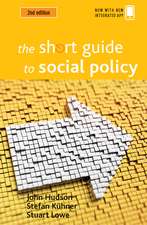The Impact of Intergovernmental Grants on the Aggregate Public Sector
Autor Daniel P. Schwallieen Limba Engleză Hardback – 30 apr 1989
Schwallie relates models of fiscal decision making to the effect of intergovernmental grants on recipient government fiscal decisions and defines the optimal behavior of both grantor and recipient governments. Several chapters offer a measured critique of both the empirical research on intergovernmental grants and theoretical models proposed to explain grantor and recipient behavior. Finally, Schwallie proposes his own general equilibrium theory of intergovernmental grants, which not only explains the existence of intergovernmental grants, but also provides a structure for measuring their impact on aggregate public sector size. Tables, figures, and diagrams illustrate points made in the text. Students of public finance, economists, grant administrators, and policymakers will find this an illuminating discussion of the impact, focus, and implications of the present intergovernmental grant system.
Preț: 345.23 lei
Preț vechi: 556.04 lei
-38% Nou
Puncte Express: 518
Preț estimativ în valută:
66.06€ • 70.64$ • 55.08£
66.06€ • 70.64$ • 55.08£
Carte tipărită la comandă
Livrare economică 18 aprilie-02 mai
Preluare comenzi: 021 569.72.76
Specificații
ISBN-13: 9780899303888
ISBN-10: 0899303889
Pagini: 176
Ilustrații: 1
Dimensiuni: 156 x 234 x 11 mm
Greutate: 0.42 kg
Editura: Praeger
ISBN-10: 0899303889
Pagini: 176
Ilustrații: 1
Dimensiuni: 156 x 234 x 11 mm
Greutate: 0.42 kg
Editura: Praeger
Descriere
The effects of the intergovernmental grant system have long been a topic of debate among politicians, economists, and political scientists. Until now, however, the question of the impact of grants on the aggregate public sector has been largely neglected. In this volume, Schwallie offers the first detailed study of the extent to which grants-in-aid have affected the size of government. In the process, he provides a good introduction to both the normative and positive theories of intergovernmental grants and a useful summary of grants-in-aid research over the past 25 years. With the aid of economic models that analyze governmental fiscal decision making, econometric findings, and recent empirical studies, Schwallie develops a well-defined theory that explains how a system of intergovernmental grants might affect aggregate public sector size.
Schwallie relates models of fiscal decision making to the effect of intergovernmental grants on recipient government fiscal decisions and defines the optimal behavior of both grantor and recipient governments. Several chapters offer a measured critique of both the empirical research on intergovernmental grants and theoretical models proposed to explain grantor and recipient behavior. Finally, Schwallie proposes his own general equilibrium theory of intergovernmental grants, which not only explains the existence of intergovernmental grants, but also provides a structure for measuring their impact on aggregate public sector size. Tables, figures, and diagrams illustrate points made in the text. Students of public finance, economists, grant administrators, and policymakers will find this an illuminating discussion of the impact, focus, and implications of the present intergovernmental grant system.
Schwallie relates models of fiscal decision making to the effect of intergovernmental grants on recipient government fiscal decisions and defines the optimal behavior of both grantor and recipient governments. Several chapters offer a measured critique of both the empirical research on intergovernmental grants and theoretical models proposed to explain grantor and recipient behavior. Finally, Schwallie proposes his own general equilibrium theory of intergovernmental grants, which not only explains the existence of intergovernmental grants, but also provides a structure for measuring their impact on aggregate public sector size. Tables, figures, and diagrams illustrate points made in the text. Students of public finance, economists, grant administrators, and policymakers will find this an illuminating discussion of the impact, focus, and implications of the present intergovernmental grant system.
Recenzii
?Overall, Schwallie provides a useful analysis and discussion of intergovernmental grants in the United States. It is accessible to any student or researcher attempting to sort out the theoretical and empirical work on the recipient government's response to grants. The author's critical evaluation of this literature and his subsequent research with respect ot fiscal discounting and the aggregate public sector contribute much to the advancement of our current state of knowledge. This volume should generate valuable future economic research on intergovernmental grants and fiscal relations.?-Public Finance Quarterly
Notă biografică
DANIEL P. SCHWALLIE is Assistant Professor of Economics at Case Western Reserve University. He has published articles on econometric theory and has recently published articles on the theory and measurement of intergovernmental grant effects in Public Finance Quarterly.












